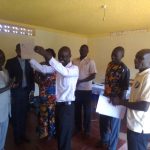In a candid reflection on the recent by-election in Dokolo, Northern Uganda, David Lewis Lubongoya, the Secretary-General of the National Unity Platform (NUP), voiced his concerns regarding the deep-rooted effects of poverty-driven political exploitation on local communities.
Uganda Peoples Congress candidate Aguti Sarah was declared the winner of the Dokolo – elections receiving 23044 votes, NRM candidate received 14001, Alwoc Austin Ogwal (late Cecelia Ogwal daughter ) 8168 , Arullo Esther obot 790 and NUP Candidate Ageno Harriet scored only 727 votes.
Lewis’s remarks shed light on the distressing pattern observed during electoral cycles, where promises of financial gain overshadow the delivery of meaningful political messages.
The by-elections in Omoro, Oyam, and Dokolo have unveiled a disheartening reality: a vast majority of people in these regions equate political engagement with the expectation of monetary incentives.
Lewis lamented that politicians, often the very individuals responsible for impoverishing these communities, exploit this desperation for votes by distributing meager sums of money, thus perpetuating cycles of poverty and dependency.
The situation reached a crescendo in Dokolo, where the spectacle of changed notes of 1,000 Ugandan Shillings became emblematic of the crisis. Several individuals were briefly detained in Dokolo and Oyam for attempting to distribute such money, underscoring the severity of the issue.
Lewis recounted a poignant scene at a rally in Dokolo, where the warmth of the people’s reception was palpable, albeit driven primarily by the anticipation of financial gain. Women laid down their belongings, waved branches, and sang songs in anticipation of monetary offerings, signaling a stark disconnect between political engagement and genuine civic discourse.
However, Lewis’s attempt to redirect the focus towards substantive political discourse encountered resistance. When approached by two middle-aged women inquiring about the distribution of money, Lewis firmly reiterated that their campaign’s policy prohibited such practices. The disappointment that followed was tangible, serving as a stark reminder of the prevailing mindset and the challenges in effecting meaningful change.
Lewis concluded by acknowledging the urgency of finding solutions to break the cycle of poverty-driven political exploitation. He emphasized the need for multifaceted approaches, including education, economic development, governance reforms, community empowerment, and political accountability. Such measures, he argued, are essential for restoring dignity to the community and fostering genuine political engagement rooted in the pursuit of progress and development.
As Northern Uganda grapples with the aftermath of the Dokolo by-election and confronts the entrenched challenges of poverty and political exploitation, Lewis’s remarks serve as a clarion call for concerted action towards building a more equitable and just society for all.



